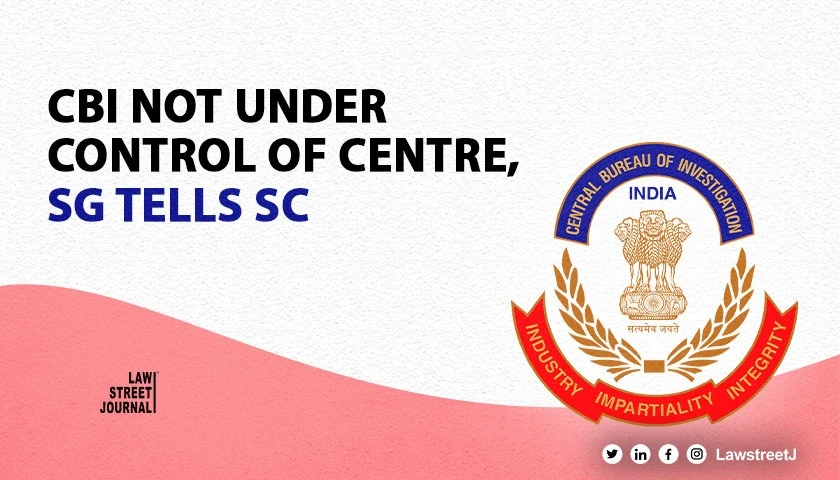NEW DELHI: The Centre on Thursday told the Supreme Court that CBI is not under the "control" of the Union government and it can't supervise either the registration of offence by the agency or its investigation.
The assertion before the top court comes at a time when several opposition leaders accused the central government of abusing the power to CBI to target them.
In preliminary objections to an original suit filed by the West Bengal government, Solicitor General Tushar Mehta raised questions before a bench of Justices B R Gavai and Sandeep Mehta over maintainability of the plea made by the state government.
The Mamata Banerjee government, had withdrawn consent to the CBI on November 16, 2018.
It claimed the central agency was going ahead with its investigation without securing the prerequisite nod from the state.
Appearing for the WB government, senior advocate Kapil Sibal for the WB government said once a foothold is given to the CBI in a state, the ED also entered, having huge ramification on the polity of the country.
Mehta, on behalf of the Centre, contended that Article 131 is "one of the most sacred" jurisdiction conferred upon the apex court and can't be allowed to be misused or abused.
He said the cases referred to in the state's suit have not been filed by the Union of India.
"The Union of India has not registered any case. CBI has done," Mehta said, adding that state has arrayed the Union of India represented by secretary of the Department of Personnel and Training (DoPT) as party in the suit.
"CBI is not under the control of Union of India," he said.
The solicitor general said that cases referred to in the suit include those which were ordered to be registered by the Calcutta High Court.
"The supervision (of CBI) is not with the Union of India. I (Centre) can't supervise either registration of the offence, I can't supervise the investigation and I can't supervise how it would lead to either a closure or a charge sheet or conviction or acquittal," Mehta said.
He also referred to the provisions of the Delhi Special Police Establishment (DSPE) Act, 1946 to buttress his contention.
He said the suit filed by the West Bengal was not maintainable because there was no cause of action against the Union of India.
Mehta said the similar issue and same question is already pending adjudication before the apex court in a special leave petition (SLP) and this fact has been suppressed by the state in the suit.
"This is a suit filed before the highest court of the country and my submission as a constitutional proposition is going to be that the suppression of fact must lead to dismissal of the suit only on that ground," he said.
Sibal, on his part, said the CBI is not a statutory authority and it is an investigating agency.
"Why can't it be considered to be a statutory authority," the bench asked.
On this, Sibal said, "It (CBI) is an investigating arm of the government."
He referred to the provisions of the DSPE Act, including Section 4 which deals with superintendence and administration of special police establishment.
"In the administrative structure of the Union of India, the supervision of the police establishment is with the Department of Personnel and Training," he said.
Sibal said when a question is asked in Parliament about the CBI, it is the minister of state for DoPT who answers it.
Referring to Section 6 of the DSPE Act, which deals with consent of state government to exercise of powers and jurisdiction, he said once the state has withdrawn its consent, the CBI can't enter the state and investigate.
"I am saying under the federal structure of this country, once a state has withdrawn consent, no investigating agency can enter into it. This does not apply, for example under the PMLA (Prevention of Money Laundering Act)," he said.
The court would hear further arguments on May 8.

















